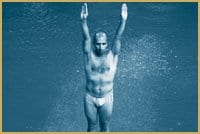The final numbers don’t look good for the first World Outgames, held in Montreal this past summer.
An independent auditor hired by the Quebec government, which invested $3 million in the games, stated last month that the Outgames is $5.3 million in the hole.
Meanwhile, the Chicago hosts of the older and perennially money-losing Gay Games, held this summer just before the Outgames, reported a deficit of only US$200,000, despite much less government funding.
So what went wrong in Montreal?
At this point, there are more questions than answers; representatives from the Montreal organizing committee are avoiding the press.
The only comments so far have been to the Montreal Gazette by Outgames co-chair Marielle Dupéré–not even a peep from her colleague Mark Tewksbury, the Olympic swimmer who was the public face of the games. Even the Outgames website has been taken down.
Dupéré told the Gazette that despite the surprising news of the deficit, “There are no regrets about the games…. Montreal needs this kind of international event to position itself in the market.”
Dupéré said the Outgames owes only $2.2 million to suppliers and that the rest of the debt is government loans. She blamed the provincial government for making it difficult for organizers to repay their loans. She also blamed Quebec Municipal Affairs Minister Nathalie Normandeau for going public with the story.
In fact, Dupéré seemed to blame everyone but Outgames organizers themselves.
“Those comments are nothing but major spin that would do a politician proud,” stated Jim Buzinski, co-founder and CEO of Outsports.com, on his website. “Montreal was already a world-class city and didn’t need to position itself with anyone.”
“They didn’t make enough money and the Outgames didn’t work the way organizers said they would,” says Jim Provenzano, a longtime observer of the queer athletics movement. “The Federation of Gay Games told them it wouldn’t work, but they wouldn’t listen.”
The Federation of Gay Games is the umbrella organization for the Gay Games, which has been hosting games since 1982. Montreal was originally chosen as the Gay Games’ 2006 host city, but a highly publicized rift between Montreal organizers and the federation–arising largely from Montreal’s desire to plan for big numbers while the federation wanted to be more conservative–resulted in Montreal founding the rival Outgames.
The federation chose Chicago as an alternative host, scheduling its events just a couple of weeks before Montreal’s. Montreal organizers came up with their own game plan, predicting a financial surplus as well as the biggest gay athletics event in history.
They were wrong on both counts.
Not only did the Outgames end up with the largest deficit in gay athletics history, but attendance fell well short of expectations.
Outgames CEO Louise Roy said in 2003 that the event needed 16,000 participants to break even. But fewer then 11,000 athletes attended, despite a scheduling overlap with Divers/Cité Pride celebrations. (Divers/Cité also reported lower attendance this year.)
“Outgames organizers had all this government support–the federal government, the province, the city. They had the support of Tourisme Montreal. It was like the welfare games. And yet they still couldn’t make it work,” says Provenzano.
“Part of the problem was that the Gay Games held their event in Chicago two weeks earlier,” he notes. “Montreal thought that when they split from the Federation of Gay Games that the federation would just roll over and die so that they could have their own event. That’s what did them in.
“Chicago was like the tortoise,” he argues. “They came into it late, but trudged along steadily. Montreal was the hare, saying, ‘Ha, ha, ha! HIV-positive athletes can’t come into the US. We have more money. We have more support. Ha, ha, ha!'”
Chicago organizers say they are “saddened” by the news of Montreal’s deficit, but refuse to say “I told you so.”
“We’re proud that the business model developed by Chicago Games Inc, in cooperation with the Federation of Gay Games, will be a success and will break the cycle of financial losses experienced by previous hosts,” says co-vice chair Kevin Boyer.
Though Chicago had planned to break even, their US$200,000 debt is still less than two percent of their overall budget, the smallest deficit ever for a Gay Games event. (The last few Gay Games have all lost money; Sydney’s 2002 games lost US$1.1 million.)
A Chicago couple has offered a US$100,000 donation if organizers can raise the rest.
So what is the future of the Outgames movement and the Gay and Lesbian International Sport Association (GLISA), the umbrella organization for the Outgames?
GLISA has already announced that the second World Outgames will take place in Copenhagen in 2009, and Calgary is set to host next year’s first North American Outgames in April 2007.
GLISA executive director Rachel Corbett told Xtra West’s Toronto sister paper Xtra that the group’s authorized spokesperson is co-president Catherine Meade; Meade did not return Xtra’s phone calls.
Provenzano says GLISA should look for ways to make things work in the future.
“It would be unfortunate if it just went away. Didn’t they get over 10,000 athletes to go to Montreal? Didn’t we double the number of athletes, when you combine Montreal’s and Chicago’s numbers? Isn’t there a way to make that happen again and have it be financially successful?”

 Why you can trust Xtra
Why you can trust Xtra


